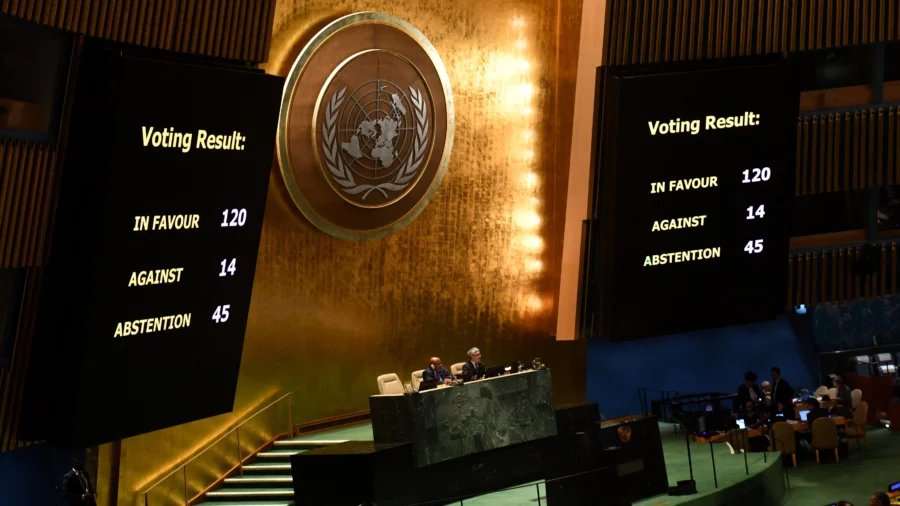The United Nations General Assembly (UNGA) on Friday overwhelmingly approved a resolution calling for an immediate “humanitarian truce” in the Gaza Strip.
The vote for the resolution, which comes amid the ongoing war between Israel and Hamas, saw 121 member states in favor, 14 against, and 44 abstentions.
The resolution is titled “Protection of civilians and upholding legal and humanitarian obligations.” Israel and the United States voted no. Five Pacific island nations and four European Union members—Austria, Croatia, Czechia, and Hungary—also opposed the measure.
It marked the first United Nations response to the Israel-Hamas war, which began on Oct. 7 when Hamas terrorists mounted an unprecedented attack on civilians in Israel that killed 1,400 people—the worst attack on the country in decades. Hamas is an Iran-backed Islamist terrorist group that controls Gaza.
“Hamas” is not mentioned at all by name in the Arab-drafted resolution. The initial draft from Arab states had called for an “immediate ceasefire,” while the adopted resolution calls for “an immediate, durable and sustained humanitarian truce leading to a cessation of hostilities.”
The vote by the 193-member UNGA on Friday came after the U.N. Security Council, a separate U.N. body, failed to reach agreement on a resolution four times in the past two weeks. Two proposed resolutions were vetoed and two failed to get the minimum nine “yes” votes required for approval.
Unlike U.N. Security Council resolutions, which have the potential to be legally binding, the UNGA resolutions are not legally binding. But United Arab Emirates Ambassador Lana Nusseibeh, the Arab representative on the U.N. Security Council, told reporters “they carry incredible weight and moral authority.” She added that the 10 elected U.N. Security Council members, who serve two-year terms, will take the “moral authority” from UNGA and try to break the gridlock on a council resolution.
The UNGA had earlier failed to obtain a two-thirds majority needed to pass a Canadian amendment to the resolution that was backed by the United States. It had garnered 88 votes in favor, 55 against, and 23 abstentions. That amendment would have included an unequivocal rejection and condemnation of the Oct. 7 “terrorist attacks by Hamas … and the taking of hostages” from Israel, as well as a demand to immediately release the hostages.
Israel has rejected calls for a ceasefire, saying Hamas terrorists would benefit. In response to the Oct. 7 attack, the country’s military has been conducting strikes aimed at Hamas targets in Gaza from the air, imposed a siege on Gaza, and is preparing a ground invasion.
Resolution Stipulations
The Jordan-led resolution framed the situation in Gaza as “Illegal Israeli actions in Occupied East Jerusalem and the rest of the Occupied Palestinian Territory” and has 14 key demands.
Besides calling for the humanitarian truce, the document also called for “immediate, full, sustained, safe, and unhindered humanitarian access” to Gaza for various U.N. humanitarian agencies and their partners who are seeking to deliver “urgent assistance to civilians in the Gaza Strip.”
The text emphasized and reiterated multiple times the importance of ensuring civilians in the Gaza Strip are safe, and said the civilians should be able to access essential supplies and humanitarian assistance, as well as be able to move around safely.
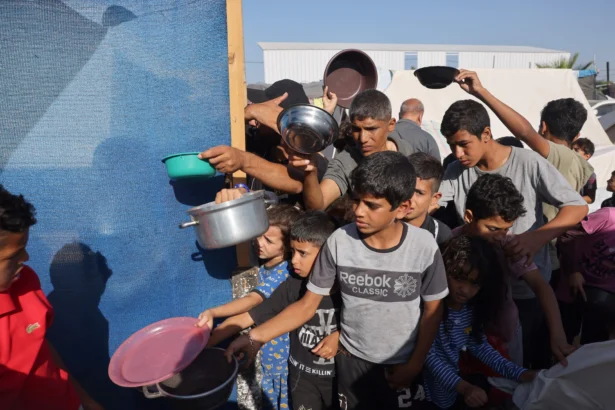
The resolution demanded that Israel—referred to in the resolution as “the occupying Power”—rescind its order “for Palestinian civilians and United Nations staff, as well as humanitarian and medical workers, to evacuate all areas in the Gaza Strip north of the Wadi Gaza and relocate … to southern Gaza.” Separately, the measure also “firmly rejects any attempts at the forced transfer of the Palestinian civilian population.”
The document separately called “for the immediate and unconditional release of all civilians who are being illegally held captive, demanding their safety, well-being, and humane treatment in compliance with international law.” It does not, however, explicitly mention the more than 200 hostages Hamas said it had kidnapped from Israel.
The resolution stressed “the particularly grave impact that armed conflict has on women and children, including as refugees and displaced persons, as well as on other civilians who may have specific vulnerabilities, including persons with disabilities and older persons.”
It also emphasized “the importance of preventing further destabilization and escalation of violence in the region,” and called upon all parties to “exercise maximum restraint.”
The resolution further “[r]eaffirms that a just and lasting solution to the Israeli-Palestinian conflict can only be achieved by peaceful means, based on the relevant United Nations resolutions and in accordance with international law, and on the basis of the two-State solution.”
Israel Vows to Continue Attacks on Hamas
Riyad H. Mansour, the Palestinian envoy to the United Nations, said he was “grateful to all the countries that voted in support” of the resolution.
“We are one in seeking an end to the killing, the trauma and terror, the destruction. This, of course, is not something that the representative of the occupying power would ever understand,” Mr. Mansour said.
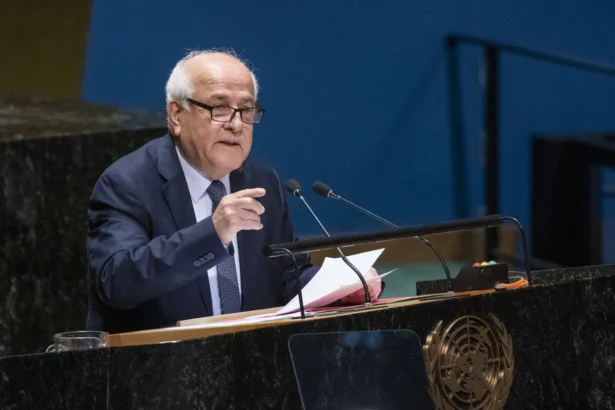
Meanwhile, Israel’s U.N. Ambassador Gilad Erdan called the UNGA vote “a day that will go down in infamy.”
“Israel has the right to defend itself, and the realization of this right is to ensure that such atrocities are never repeated. The only way, the only way to ensure this is the eradication of Hamas’ terror capabilities. The only way. Yet this resolution does not even name Hamas, as if this war started on its own,” Mr. Erdan said after the vote.
“Israel will not stop the operation until Hamas terror capabilities are destroyed and our hostages are returned. … And the only way to destroy Hamas is root them out of their tunnels and subterranean city of terror,” he said.
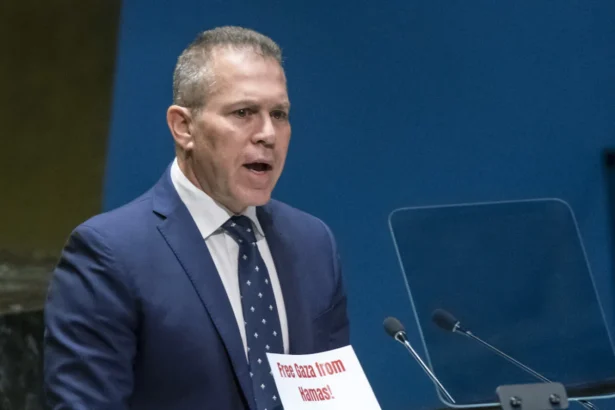
“Why are you defending murderers? Why are you defending terrorists that deliberately beheaded children and abducted baby babies? What is going on here? This must make each of you ask yourselves what the true aim was when this resolution was submitted,” he told UNGA.
“Yet this dangerous resolution demands that Israel call for Gazans to return, return to this active war zone. Is the goal here to further endanger human lives? This ridiculous resolution has the audacity to call for a truce. The goal of this resolution’s truce is that Israel should cease to defend itself [against] Hamas, so Hamas can light us on fire,” he said.
“Israel is closely monitoring the humanitarian situation in Gaza, and we know that there is no humanitarian crisis in accordance with international humanitarian law. Trusting the reports coming out of Gaza is exactly like trusting reports from ISIS,” he added, referring to the terrorist organization in Syria.
Since Oct. 7, Israel has vowed to wipe out Hamas’s terrorist capabilities and has been conducting the largest-ever bombing campaign against Hamas, targeting sites in Gaza used by Hamas terrorists. The Israeli military has repeatedly condemned Hamas for using Gaza civilians as “human shields.” It has noted that Hamas terrorists have been firing rockets from civilian infrastructure, areas, and buildings in the Gaza Strip, thereby making such sites legitimate targets for the Israeli military to strike. It further blames Hamas for intentionally doing this to maximize international condemnation of any Israeli attempts to fight back against the terrorists.
‘Expanding’ Ground Operations in Gaza
On Friday, Israel announced it is “expanding” ground operations in Gaza. Israeli officials have, for weeks, signaled that a ground invasion of Gaza would be coming. Israel had on Oct. 12 encouraged some 1.1 million people in Gaza—almost half the population—to move south. The Israeli military had, weeks ago, disclosed plans to target Hamas’s sprawling tunnel network beneath Gaza City, which the terrorists use and is shielded by civilian structures above. Hamas, on the other hand, vowed to fight to the last drop of blood and instructed Gazan residents to refrain from evacuating the area.
The Hamas-backed Gaza Health Ministry said more than 7,000 civilians have been killed. The Epoch Times cannot independently verify the figure. The Israeli military recently pointed out that a notable portion of the rockets Hamas has fired toward Israel since Oct. 7 have fallen short and hit Gaza. In past conflicts, some Palestinian deaths in Gaza have been attributed to Hamas rockets that fell short.
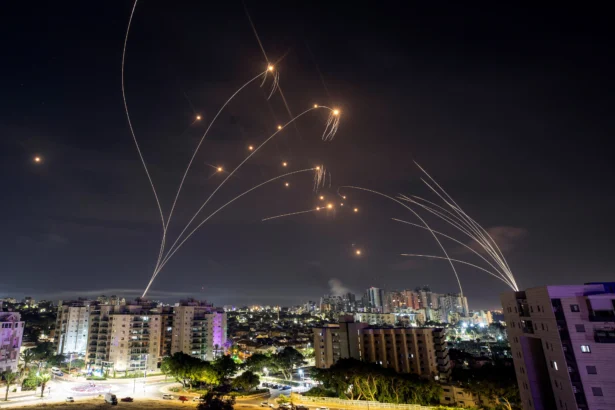
The issuance of the UNGA resolution came on the same day Iran’s foreign minister accused the U.S. government of “managing the genocide in Palestine” and warned that the United States will “not be spared from the fire” if Israel keeps bombarding Gaza.
“I warn if the genocide in Gaza continues, they will not be spared from this fire. It is our home and West Asia is our region,” Hossein Amir-Abdollahian said. “We do not compromise with any party and any side and have no reservations when it comes to our home’s security,” he said.
The Iranian minister added that Hamas is prepared to release the “civilian prisoners” as a result of Iran’s negotiations with the group.
Iran has consistently been the largest supporter of Hamas and other terrorist groups involved in terrorist attacks against Israel. It is unclear whether Iran was directly involved in the Oct. 7 attacks that sparked the war, but Iranian officials have spoken in support of the attacks.
White House national security spokesman John Kirby has said the United States did support a pause in Israeli military activity in Gaza to get humanitarian aid, fuel, and electricity to civilians there. He also said that if getting more than 200 hostages abducted by Hamas out of Gaza required a localized temporary pause, then the U.S. supports that.
Iran’s threats come as the United States is holding Tehran responsible for the recent wave of rocket and drone attacks targeting American troops in the Middle East.
Meanwhile, along Israel’s northern border, tensions rise as Iran-backed Hezbollah terrorists unleash rockets into Israel, warning of an even larger barrage if Jerusalem launches a ground assault into Gaza.
Josee Ng, The Associated Press, and Reuters contributed to this report.
From The Epoch Times

